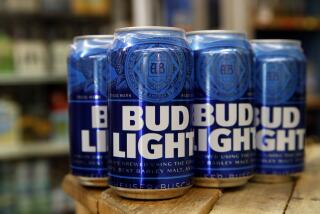Consumer Confidential: Twinkies, Coors Light, colon cleansing
- Share via
Here’s your take-me-home-tonight Tuesday roundup of consumer news from around the Web:
-- There’s no sugar high for Hostess Brands, maker of the Twinkie and other fine products. The company is reportedly preparing to go back into bankruptcy just two years after completing its last bankruptcy proceedings. People familiar with the matter say the company is facing a cash crunch with more than $860 million in debt, high labor expenses and rising ingredient costs. When Hostess, then called Interstate Bakeries, filed for bankruptcy protection in 2004, it blamed low sales and high fixed costs. It emerged in February 2009. The company employs about 19,000 workers and operates in 49 states. Nearly 36 million packages of Twinkies were sold in the year ended Dec. 25. That’s a drop of almost 2% from a year earlier. (MoneyWatch)
-- We’re No. 2! Coors Light surpassed Budweiser in 2011 to become the country’s second-bestselling beer, according to the trade publication Beer Marketer’s Insights. The milestone comes after years of declines by Budweiser, the only full-calorie beer in the top five U.S. beers. Bud Light is the top-selling beer by a sizable margin. Miller Lite is fourth, with Natural Light rounding out the top five. Coors Light has been posting slow but steady growth. Coors Light sales grew 0.8%, to 18.3 million barrels in 2011, while Bud sales declined 4.6% to 17.7 million barrels. (Chicago Tribune)
-- A company that peddled “colon cleansers” has agreed to pay $1.5 million to settle federal claims that it used fraudulent marketing, phony claims and bogus endorsements from Oprah Winfrey and Rachael Ray to sell its wares. The Federal Trade Commission’s complaint alleged that two individuals and five related companies deceptively claimed that their Acai Pure supplement would cause rapid and substantial weight loss, and that their Colotox colon cleanser would prevent colon cancer. Also, despite claiming to offer a “free” trial for a nominal fee and full refunds upon request, the defendants allegedly made unauthorized charges to consumers’ bank accounts, and made it all but impossible to avoid paying full price for the products, typically $39.95 to $59.95. (ConsumerAffairs.com)
More to Read
Inside the business of entertainment
The Wide Shot brings you news, analysis and insights on everything from streaming wars to production — and what it all means for the future.
You may occasionally receive promotional content from the Los Angeles Times.











